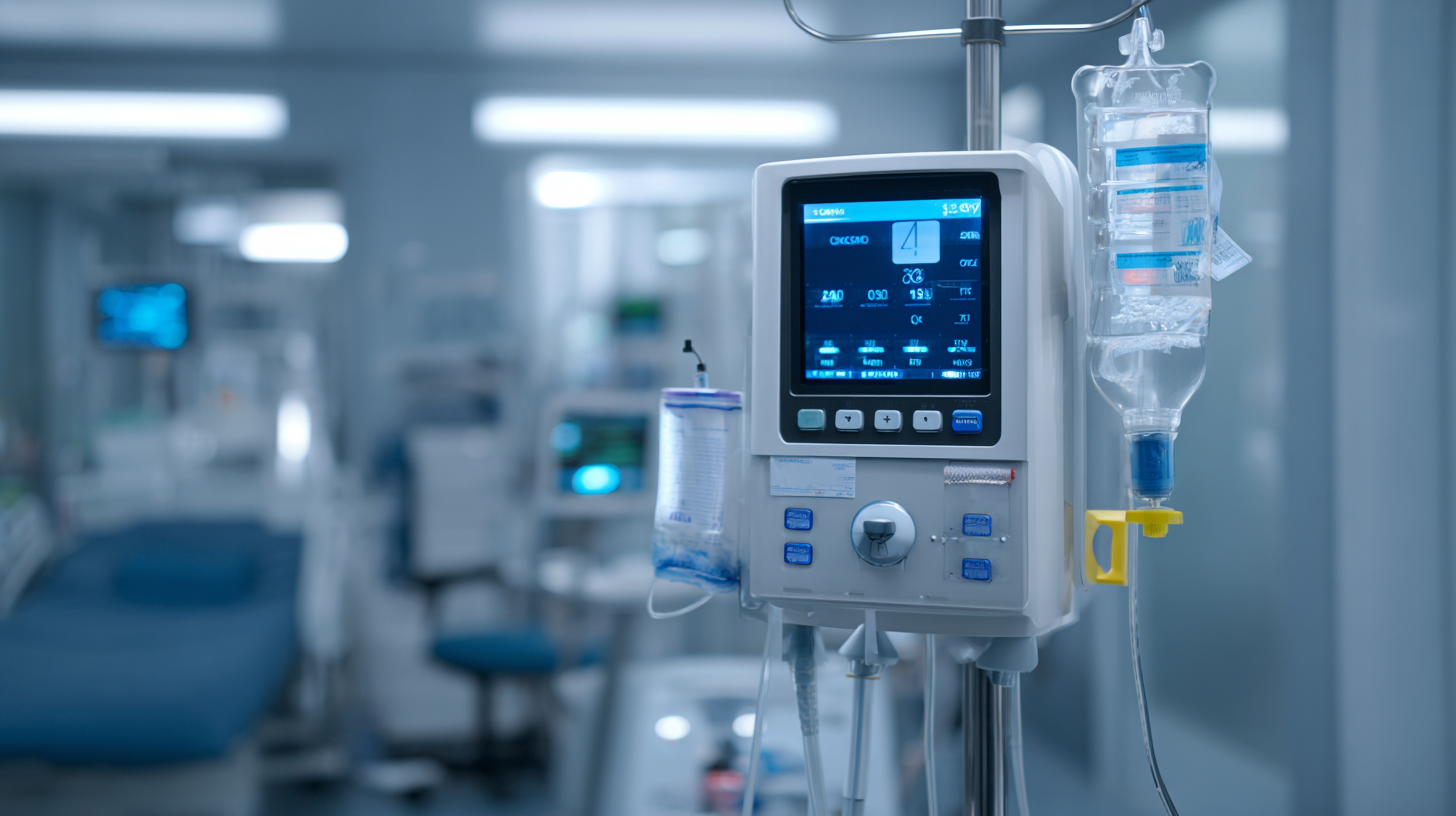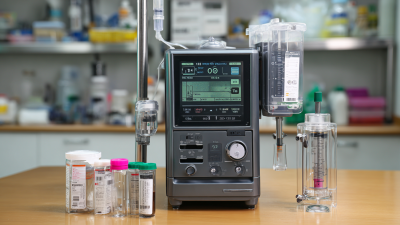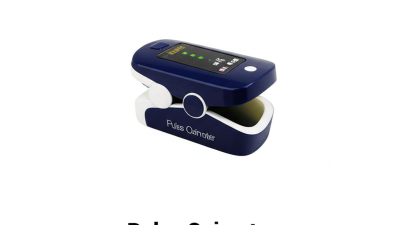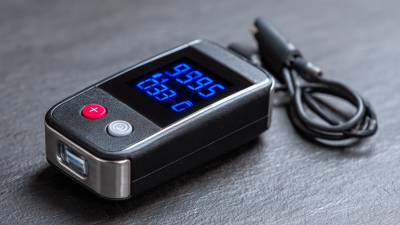Understanding How Infusion Pumps Revolutionize Patient Care and Medication Delivery
The advent of infusion pumps has significantly transformed patient care and medication delivery, marking a pivotal shift towards precision and safety in medical treatment. According to a report by MarketsandMarkets, the global infusion pump market is projected to reach USD 6.66 billion by 2025, driven by the increasing demand for automated drug delivery systems and the growing prevalence of chronic diseases.
 Infusion pumps facilitate the controlled delivery of medications, ensuring that patients receive the correct dosage at predetermined intervals, which is crucial in critical care settings where even minor deviations can lead to serious complications. Furthermore, a study published in the Journal of Patient Safety underscores that the implementation of smart infusion technology has been linked to a 51% reduction in medication errors. As healthcare continues to evolve, understanding the role of infusion pumps is essential for enhancing patient outcomes and improving the overall efficiency of care delivery systems.
Infusion pumps facilitate the controlled delivery of medications, ensuring that patients receive the correct dosage at predetermined intervals, which is crucial in critical care settings where even minor deviations can lead to serious complications. Furthermore, a study published in the Journal of Patient Safety underscores that the implementation of smart infusion technology has been linked to a 51% reduction in medication errors. As healthcare continues to evolve, understanding the role of infusion pumps is essential for enhancing patient outcomes and improving the overall efficiency of care delivery systems.
How Infusion Pumps Work: The Technology Behind Effective Medication Delivery
Infusion pumps are sophisticated medical devices that play a critical role in patient care by delivering precise amounts of medication, nutrients, or other fluids into a patient's body. The core technology behind these pumps is a series of sensors, algorithms, and mechanical components that work in unison to ensure accurate and controlled infusion. Most infusion pumps utilize a programmable microprocessor that allows healthcare providers to set and monitor various parameters, such as flow rate and volume, tailoring the delivery method to the specific needs of each patient.
The innovation in infusion pump technology also includes safety features designed to minimize errors and enhance patient safety. Many modern pumps are equipped with advanced alarm systems that alert caregivers to potential issues, such as occlusions or air in the line. Additionally, many models incorporate smart technology that can cross-reference prescribed doses against patient profiles to prevent overdosing or underdosing. This integration of technology not only streamlines the medication delivery process but also provides peace of mind to both healthcare providers and patients, ensuring a more effective and efficient treatment regimen.
Key Advantages of Using Infusion Pumps in Patient Care
Infusion pumps have transformed the landscape of patient care, providing numerous advantages that enhance medication delivery and overall treatment outcomes. One of the key benefits of using infusion pumps is their precision in drug administration. These devices enable healthcare professionals to deliver medication at accurately controlled rates, minimizing the risk of human error associated with manual injections or infusions. This precision is particularly critical in high-stakes environments, such as critical care units and during complex surgical procedures, where even slight deviations in dosage can have significant consequences.
Another notable advantage of infusion pumps is their ability to deliver a range of intravenous therapies seamlessly. These pumps can handle various types of fluids, including medications, nutrients, and blood products, all while allowing for continuous monitoring and adjustment of delivery rates. This versatility is essential in cases where patients require multiple therapies simultaneously, as infusion pumps can be programmed to manage these complex regimens effectively. Additionally, the integration of alarms and alerts in modern infusion pumps ensures that healthcare providers are promptly notified of any issues, thus enhancing patient safety and care efficiency.
Tips for Selecting the Right Infusion Pump for Your Clinical Setting
When selecting the right infusion pump for your clinical setting, it's crucial to consider several key factors that can significantly impact patient care and operational efficiency.

First, evaluate the specific needs of your patient population. Different clinical environments, such as intensive care units, surgical settings, or outpatient facilities, have varying requirements in terms of medication types, infusion rates, and monitoring capabilities. Understanding these needs will help narrow down your options.
Next, assess the pump's features and functionalities. Modern infusion pumps come equipped with advanced technologies, including dose error reduction systems, programmable settings, and customizable alerts. These features can enhance safety and precision in medication administration.
Additionally, consider the ease of use and the level of training required for staff to operate the device effectively, as user-friendly interfaces can reduce the risk of errors and improve workflow.
Finally, don't overlook the importance of service and support from the manufacturer, including training, maintenance, and availability of replacement parts, to ensure the longevity and reliability of your infusion pumps.
Best Practices for Operating Infusion Pumps Safely and Efficiently
Operating infusion pumps safely and efficiently is crucial for ensuring optimal patient care and effective medication delivery. First and foremost, healthcare professionals must receive comprehensive training on the various types of infusion pumps available, including their features, settings, and potential complications. Regular workshops and simulation exercises can enhance their skills and confidence in using these devices, ultimately minimizing errors during administration.
Additionally, meticulous adherence to protocols is essential. Clinicians should always double-check medication labels, dosages, and infusion rates before starting the pump. Employing standardized checklists can further reduce the risk of human error. Moreover, continuous monitoring of the infusion process is vital to quickly identify and address any alarms or malfunctions that may arise. Leveraging technology, such as integration with electronic health records, can facilitate real-time updates and notifications, enhancing patient safety and treatment efficacy. By implementing these best practices, healthcare facilities can not only improve patient outcomes but also ensure a safer environment for administering intravenous therapies.

The Future of Infusion Pump Technology in Healthcare Innovation
The future of infusion pump technology in healthcare innovation looks promising, with projections suggesting a market growth from USD 5.6 billion in 2021 to USD 11.2 billion by 2028, at a compound annual growth rate (CAGR) of 10.5%. This rapid expansion is driven by advancements in smart infusion pumps that enhance the precision of medication delivery while reducing the potential for human error. With features like wireless connectivity and integrated drug libraries, these devices are transforming patient care, allowing healthcare providers to monitor treatment outcomes in real time.
Tips: When considering infusion pump technology, it is essential to stay updated on the latest safety features and guidelines. Always ensure that healthcare personnel receive proper training on device usage and software updates, as this significantly reduces the likelihood of medication errors.
Moreover, the integration of artificial intelligence (AI) in infusion pumps is set to revolutionize patient safety further. AI can enable predictive analytics, allowing for better customization of infusion rates based on individual patient needs and responses. This innovative approach not only optimizes medication delivery but also enhances overall patient outcomes.
Tips: Engage with your healthcare team and technology providers to ensure that your facility is adopting the best practices for utilizing advanced infusion pump technologies. Regularly review performance data and patient feedback to continuously improve medication administration processes.
Related Posts
-

How to Identify High Quality Manufacturers for Best Syringe Infusion Pump
-

Top 10 Pulse Oximeter Manufacturers from China at the 137th Canton Fair
-

How to Select the Best Stress Test Machine for Your Manufacturing Needs
-

China Pride in World Class Manufacturing of Best Stress Test Machines for Global Export
-

Emerging Innovations in Syringe Infusion Pumps for Future Healthcare Solutions
-

5 Essential Tips to Choose the Right Medical Pulse Oximeter for Accurate Readings

